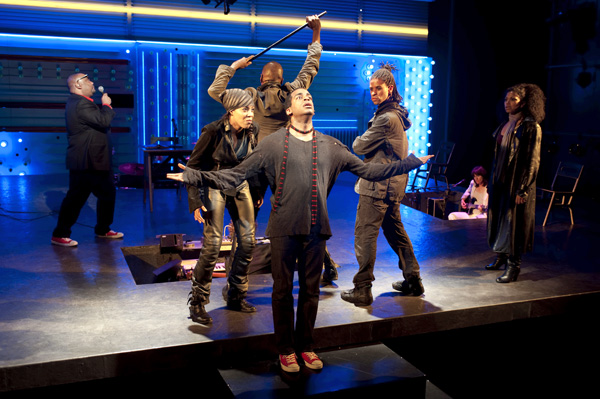|
Reviews of Recent Independent, Foreign, & Documentary Films in Theaters and DVD/Home Video

PASSING STRANGE: THE MOVIE Passing Strange: The Movie is exactly what its title states: Passing Strange. The movie. This is not to denigrate the talent of Stew and his collaborator Heidi Rodewald, which is on full display in this film of their elegiac 2006 play. Produced in New York at the Public Theater, and then moved to a Broadway home at the Belasco Theater, Passing Strange is a strange hybrid of music and theater—but not musical theater. (At one point, the narrator even jokes, “We were going to do a peppy musical number here. But we don’t know how to write those”). Its books and the lyrics are interwoven so firmly into the portrait of the artist as a young man that they become one. Words are merely the music of everyday life, while music—and art—is “more real” than life itself. Enhanced with a minimal set and elegant lighting, the cast and band are the focus. Both share the stage as now middle-aged Stew, the Narrator, follows the story of Youth (Daniel Breaker) as the latter tries to discover “the real” in life, music, and love, beginning in 1970 Los Angeles. As theater, Passing Strange is a wonderful piece of art. Stew is a tour de force of talent, with a palpable energy felt even through the distance of a camera lens. The acting has a rawness brought about by the fact that the story represented onstage is simultaneously represented in the flesh, by the man upstage. Going beyond meta, it’s hard to tell where the play leaves off and life walks on. As Stew watches his Youth fling himself into new genres of musical expression (ranging from punk to pop to rock to post-modern German theater) you sense the amused exasperation he feels towards his younger self. Who is this person? Stew is asking. Yet at the same time, there is no one who understands his Youth better. The music, pure rock with the hint of blues, is defined by its lyricism. Lines like “a collection of verbs disguised as nouns” and a “mother and child tableau vivant” are half-spoken, half-sung as Stew caresses the strings of his electric guitar. Music is Stew’s solace and guard against a world where “Black folks [are] passing for black folks.” But the world can’t always be kept at bay, and when Stew, as Youth and Narrator, has to face the death of his mother, his battle cry, “just ask the song,” fades into insignificance. Ultimately, Stew is forced to conclude he can’t find “the real,” only love, which is more than real, but somehow even that answer seems lacking. To his credit, director Spike Lee lets the musical stand on its own two feet. Filming the last several performances of the play at the Belasco, the footage gathered has been edited together to create one seamless, full performance. Rarely is the intrusion of the camera felt, and what is obviously filmic only enhances. One scene in particular, where Youth goes through a punk rock period, is cleverly framed like an early MTV music video.
The word “video” is unfortunately what comes to mind when
watching what is supposed to be a film. (Perhaps a better title would be
"Passing Strange: The Video"). Lee has created beautiful footage,
but the rapport between director and audience in a film is vastly different
than that produced within the confines of a theater. One is
intimate, the other personal. Lee follows the action onstage exactly,
with close-ups on the faces of the actors and the band, which reveal a depth
of emotion that even the closest seated theatergoer cannot see. Yet the
connection is limited. Stew’s concentration is on the audience in the
theater before him, not those seated before the screen. The camera
forces the second viewer into the position of the third wheel. He
watches and listens to a conversation in which he cannot participate.
Though its subject never bores, the
presentation frustrates. Yes, Passing Strange is a wonderful
play. For that, give me a seat in the Belasco, not a ticket to a movie
theater. Lisa
Bernier
|

